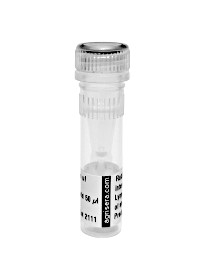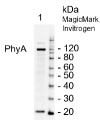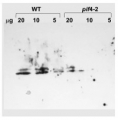1

Anti-Phy | Phytochrome (clone Pea-25)
- Product Info
-
Sub class: IgG Immunogen: Phytochrome Host: Mouse Clonality: Monoclonal Purity: Immunoglobulin Protein G purified, in PBS pH 7.4, 150 mM NaCl, 0.05 % of sodium azide. Format: Liquid Quantity: 100 µg Storage: Store at -20°C; Avoid repeated freeze-thaw cycles. Please remember to spin the tubes briefly prior to opening them to avoid any losses that might occur from material adhering to the cap or sides of the tube. Tested applications: ELISA (ELISA), Competitive ELISA, Immunoprecipiation (IP), Western blot (WB) Recommended dilution: assay dependent Expected | apparent MW: 124 kDa - Reactivity
-
Confirmed reactivity: Avena sativa, Pisum sativum Predicted reactivity: graminae, fabaceae
Species of your interest not listed? Contact usNot reactive in: No confirmed exceptions from predicted reactivity are currently known - Additional Information
-
Additional information (application): Epitope recognized by this antibody is located at 85 kDa from N-terminus and is highly conserved (no photo-conversion) - Background
-
Background: Phytochrome is a photomorphogenically active pigment that modulates plant growth and development with respect to incident light intensity and wavelength distribution. It exists in two forms: an inactive, red-absorbing form (Pr),4 and an active far-red-absorbing form (Pfr). When either absorbs light, it is photoconverted to the other. Phytochrome is a dimeric, water-soluble, relatively labile chromoprotein with similar, if not identical, monomers of about 124 kDa each. It is also a relatively low abundance protein, even under the best of conditions. Genetic manipulation of phytochrome expression in plants leads to plants requiring less light and able to divert more energy to the production of fruits and seeds. For its physicochemical characterization, it has therefore been difficult to utilize techniques that require large quantitites of highly purified protein. Consequently, indirect methods for elucidating its structure/function relationships are especially important. These could also be applicable to fabaceae and closely related families. - Product Citations
-
Selected references: Pratt et al. (1988). Mapping of antigenic domains on phytochrome from etiolated Avena sativa L. by immunoblot analysis of proteolytically derived peptides. Arch Biochem Biophys. 267(2):723-35. doi: 10.1016/0003-9861(88)90081-1.
Cordonnier et al. (1983). Production and purification of monoclonal antibodies to Pisum and Avena phytochrome. Planta. 158(4):369-76. doi: 10.1007/BF00397340.
- Protocols
-
Agrisera Western Blot protocol and video tutorials
Protocols to work with plant and algal protein extracts
Agrisera Educational Posters Collection - Reviews:
-
This product doesn't have any reviews.
Accessories

AS07 220 | Clonality: Polyclonal | Host: Rabbit | Reactivity: Arabidopsis thaliana, Nicotiana benthamiana, Nicotiana tabacum


